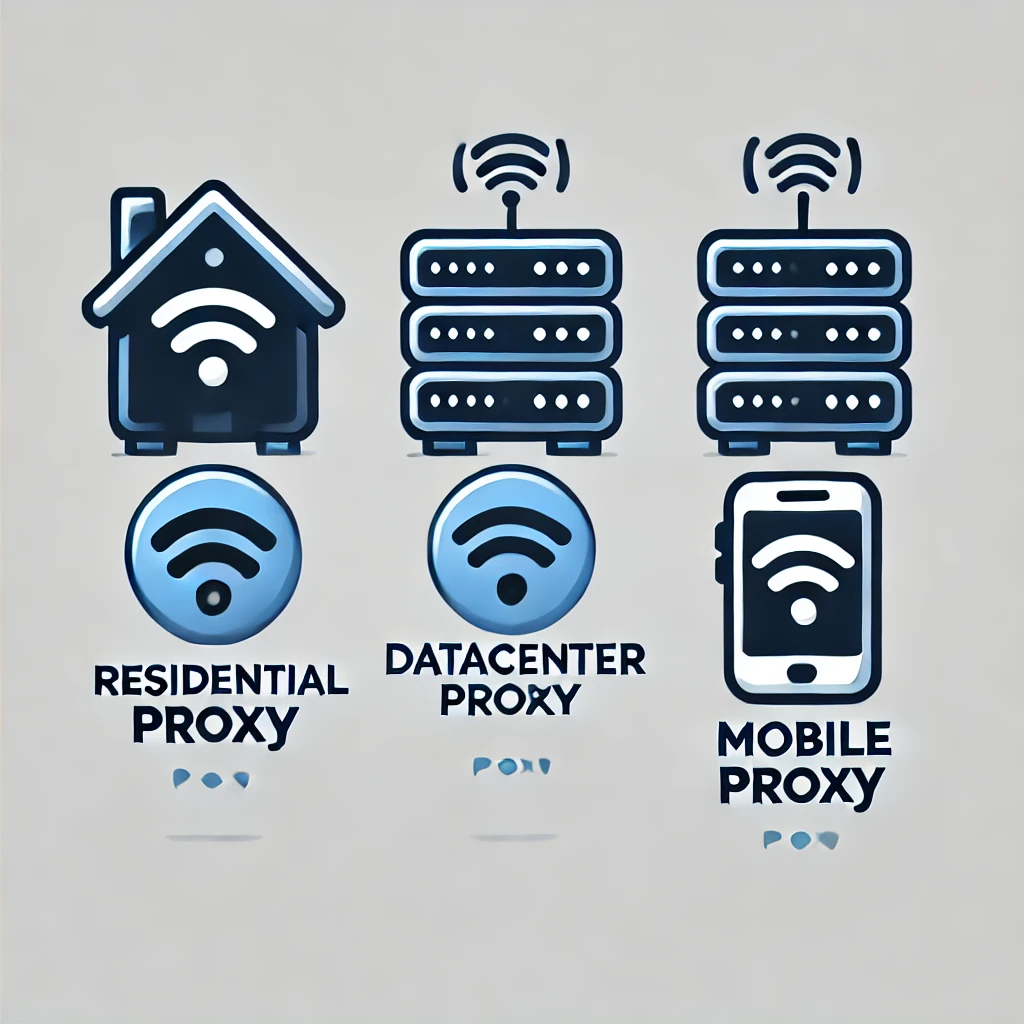Crypto trading platforms love rules. And not the kind you can easily follow.
Some are region-locked. Some ban accounts at the drop of a hat. And all of them seem hellbent on making life as complicated as possible for the people who actually use them.
But here’s the thing: it’s not your job to play nice with arbitrary restrictions. It’s your job to trade securely, access the platforms you need, and keep your data out of anyone else’s hands.
Enter proxies.
Think of them as your behind-the-scenes fixer, quietly ensuring you get where you need to go without raising alarms. They mask your IP address to protect your identity, bypass regional blocks, and let you manage multiple accounts like it’s no big deal (because it shouldn’t be).
In this guide, we’ll break down everything you need to know about using proxies for cryptocurrency trading. No jargon. No fluff. Just the tools you need to take control of your trading—and maybe even enjoy the process again.
Let’s dive in.
Understanding Proxies: What They Actually Do (and Why You Should Care)
Let’s talk about proxies.
Not the “stand-in at a board meeting” kind, but the digital kind—the ones that step in between you and the internet to handle all the messy bits. Think of a proxy as your middleman, except this one isn’t charging a markup or forgetting your coffee order. It’s there to keep your identity safe, your access smooth, and your crypto trading options wide open.
Here’s the deal: every time you log in to a platform, your IP address tags along. That little string of numbers is like your online fingerprint—unique, traceable, and sometimes way too revealing. Trading platforms use it to decide whether you’re “allowed” to be there. Hackers might use it to decide whether you’re a good target. And bans? They use your IP like a dartboard.
Proxies fix this. They replace your IP address with one that fits the situation. Need to access a region-locked platform? Done. Want to manage multiple accounts without setting off alarms? No sweat. Proxies even make your connection look so normal that bots and moderators won’t bat an eye.
The best part? You don’t need to be a tech wizard to use them. A good proxy service—like IPBurger’s, just saying—handles the technical side so you can focus on what matters: making smart trades without unnecessary roadblocks.
Next, we’ll dig into the specifics: how proxies protect you, how they bypass restrictions, and what to look for in a service. Because not all proxies are created equal, and if you’re putting your crypto trading future in someone’s hands, you’d better make sure they know what they’re doing.
How Proxies Keep You Secure

Let’s cut to the chase: security is everything in crypto trading.
When you’re moving digital assets worth real money, you’re not just trading coins—you’re putting a target on your back. Cybercriminals, shady platforms, even nosy ISPs (Internet Service Providers)—they’re all waiting for an opportunity to snoop, steal, or flat-out lock you out.
Here’s where proxies earn their keep.
By masking your real IP address, proxies shield your identity and location. The result? Your online activity becomes virtually untraceable. No one—not your ISP, not hackers, not even the platform moderators—gets a direct line to your personal details.
But it’s not just about anonymity. Proxies also help you avoid common threats like:
- IP Bans: Ever been blocked from a platform for “suspicious activity”? Proxies give you fresh IPs to avoid these bans while staying under the radar.
- DDoS Attacks: These “denial of service” attacks can cripple your connection. Proxies act as a buffer, absorbing the attack and keeping your trading setup intact.
- Man-in-the-Middle Attacks: Sounds like a spy thriller, right? It’s not. It’s when attackers intercept your data mid-transaction. Proxies encrypt your connection, making it nearly impossible for bad actors to eavesdrop.
Of course, not just any proxy will do. A poorly managed or shared proxy can be just as risky as no proxy at all. That’s why choosing a reliable provider matters. (Yes, this is the part where IPBurger comes in, but we’ll let the features do the bragging later.)
Proxies aren’t just for privacy fanatics—they’re for anyone who takes trading seriously. Up next: how they don’t just protect your connection but also open up trading opportunities you didn’t even know you had.
Bypassing Regional Restrictions: Trading Without Borders

If you’ve ever tried to log into a crypto exchange only to see a frustrating “Service Unavailable in Your Country” message, you know the sting of regional restrictions.
It’s not just annoying—it’s limiting.
Crypto trading should be global. After all, isn’t the whole point of crypto to break free from traditional financial barriers? But regional restrictions say otherwise, locking you out based on where you’re physically located.
Here’s the thing: those restrictions don’t care about your goals. But proxies? They do.
By rerouting your connection through an IP address in a country where the platform is accessible, proxies make those restrictions vanish. Suddenly, it doesn’t matter if you’re in Singapore, San Francisco, or Siberia—your IP says you’re in an approved region, and that’s all the platform sees.
What Can You Do with This Power?
- Access Restricted Exchanges: Platforms like Binance, Coinbase, or Kraken often have different rules depending on the country. Proxies let you sidestep those boundaries and trade wherever the conditions are most favorable.
- Unlock Features: Some exchanges roll out new tools and features region-by-region. A proxy ensures you’re not stuck waiting for access.
- Compare Global Markets: Prices and liquidity can vary by region. With proxies, you can tap into multiple markets to find the best opportunities.
The Legal Stuff You Need to Know
Before you start proxy-hopping around the world, it’s worth noting that while bypassing geo-restrictions is technically straightforward, it may not always align with a platform’s terms of service. That’s why it’s essential to stay informed about the policies of the exchanges you use.
Proxies give you the ability to trade globally, but how you use that power? That’s on you.
Next, we’ll explore how to choose the right proxy for your trading needs—because not all proxies are built to handle the demands of crypto traders.
Choosing the Right Proxy for Crypto Trading

Not all proxies are created equal.
Some are fast, secure, and reliable—perfect for the high-stakes world of cryptocurrency trading. Others? Let’s just say they’re about as useful as a screen door on a submarine. If you’re serious about protecting your trades, bypassing restrictions, and avoiding bans, you need a proxy that works with you, not against you.
So, how do you separate the winners from the duds? Here’s what to look for:
1. Residential Proxies vs. Datacenter Proxies vs. Mobile Proxies
- Residential Proxies: These are gold for crypto traders. They’re tied to real devices and ISPs, making them look completely natural to trading platforms. This means fewer bans, fewer flags, and more seamless access.
- Datacenter Proxies: While fast and cost-effective, they’re often easier for platforms to detect. Good for scraping data or quick tasks, but not ideal for crypto trading.
- Mobile Proxies: These offer IPs tied to mobile devices, making them highly dynamic. Great for accessing hard-to-reach platforms, but they come at a premium.
2. Speed and Reliability
In crypto, timing is everything. A proxy that lags can cost you a trade—or worse, lock you out when you need it most. Look for providers with high uptime (99% or better) and fast connections.
3. Anonymity and Security
Your proxy should do one job above all else: protect you. This means masking your real IP and keeping your data encrypted. Look for services with a proven track record of securing user privacy and avoiding IP leaks.
4. Session Control
Sticky or rotating? This depends on your needs:
- Sticky Proxies keep the same IP for longer periods, ideal for managing accounts or accessing geo-locked platforms.
- Rotating Proxies change IPs frequently, perfect for scraping global data or avoiding detection during high-volume tasks.
5. Global Coverage
Regional restrictions? What regional restrictions? The right proxy service will offer IPs from countries all over the world, giving you the flexibility to trade on any platform, in any region, whenever you need.
6. Reputable Providers
Finally, don’t just grab the first proxy service you find. Look for providers with strong reviews, ethical sourcing practices, and a reputation for reliability. (Spoiler: IPBurger checks all these boxes.)
Picking the right proxy isn’t just about functionality—it’s about ensuring your trading strategy stays rock solid. Up next, we’ll show you how to set everything up so you can start trading smarter today.
Setting Up and Configuring Proxies for Crypto Trading

So, you’ve chosen the right proxy—great! Now it’s time to set it up. But before you start, let’s debunk a common myth: setting up proxies isn’t rocket science. You don’t need a tech degree or a 300-page manual. With the right provider (hint: IPBurger), it’s as straightforward as logging in and following a few steps.
First, decide how you’ll be using your proxy. Are you accessing a specific crypto exchange from a restricted region? Managing multiple accounts? Or simply adding an extra layer of security? Your goals will determine how you configure your proxy.
Let’s break it down:
1. Use Proxy Credentials
When you purchase a proxy service, you’ll get login details, including an IP address, a port number, and credentials. These are your keys to the proxy network. You’ll input them directly into your browser, trading platform, or proxy management software.
2. Configure Proxies for Popular Crypto Platforms
Most major exchanges, like Binance, Coinbase, and Kraken, allow access through proxies (even if they don’t exactly roll out the red carpet for them). Here’s how to integrate proxies with your platform:
- Navigate to your platform’s network or connection settings.
- Enter the proxy details provided by your service.
- Save and test the connection to ensure everything works smoothly.
For platforms with stricter rules, you may need to use browser extensions or proxy-friendly software to connect indirectly.
3. Test Your Proxy Setup
Before diving into trading, make sure everything works. IP leak tests and connection speed checks are your best friends here. This ensures your proxy is fully operational and your real IP is masked.
4. Fine-Tune Your Session Preferences
Most proxy services let you choose between sticky sessions (where your IP stays consistent) and rotating sessions (where it changes periodically). If you’re managing accounts or accessing a single platform, stick with sticky sessions. For tasks like scraping global data, rotating proxies are your go-to.
5. Keep Your Proxy Updated
Platforms evolve, and so do their detection methods. Regularly update your proxy settings and monitor changes to ensure uninterrupted access. A good provider will offer support to guide you through any hiccups.
With everything configured, you’re ready to trade securely and without restrictions. Up next, we’ll discuss some best practices to keep your trading smooth and your accounts safe for the long haul.
Best Practices for Trading with Proxies

Once your proxy is set up, it’s tempting to think you’ve cracked the code. Security? Check. Anonymity? Check. Access to geo-blocked platforms? Double check.
But proxies aren’t a “fire and forget” kind of tool. They’re more like a car: they need maintenance to keep running smoothly, and if you push them too hard, things will go south fast.
Here’s the first rule: stay proactive. Platforms evolve. Detection systems get smarter. What worked last month might raise red flags this month. Regularly review your proxy’s performance. Is it still masking your location effectively? Is it keeping up with your trading speed? Staying ahead of potential issues is what separates smooth operations from sudden bans.
Next: don’t get greedy. Sure, proxies can bypass restrictions, but that doesn’t mean you should start treating platforms like a playground. If an exchange’s policies say “no proxies allowed,” flaunting them recklessly is a great way to get yourself permanently booted. Use proxies strategically. Smart trading is about balance—not daring the moderators to catch you.
Oh, and let’s talk security for a second. A proxy isn’t a magic shield. It masks your IP, but it doesn’t protect you from human error. Click on a phishing link or log in to a sketchy trading platform, and you’re in trouble. Stick to verified exchanges, double-check URLs, and don’t take shortcuts with your credentials.
Finally, don’t forget about the people behind the tech. Your proxy provider’s support team is your ally. If you run into issues—or just want to make sure you’re optimizing your setup—they’re there to help. A quick email or chat can save hours of frustration.
Proxies aren’t a “one and done” solution. They’re a tool you use thoughtfully, tweaking and adapting as you go. Used well, they’ll give you an edge in the high-stakes world of crypto trading. Used carelessly? Well, you might as well trade without them.
So, what’s next? Wrapping it all up and giving you the final takeaways for smarter, safer trading. Stay with me.
Wrapping It All Up: Smarter, Safer Trading with Proxies
If you’ve made it this far, you’re no casual crypto trader. You’re someone who wants control—over your access, your security, and ultimately, your success.
Proxies aren’t just another tool in your trading arsenal. They’re the key to leveling the playing field in a world where platforms love rules that don’t seem to love you back. Whether it’s bypassing regional restrictions, avoiding account bans, or keeping your personal data under wraps, proxies put you in charge of how you trade.
But let’s be clear: proxies aren’t a cure-all. They’re only as good as how you use them. The right setup requires regular maintenance, thoughtful choices, and a healthy respect for the platforms you’re navigating. Get lazy, and those same platforms will be quick to remind you who’s boss.
The bottom line? Use proxies like a pro. Choose a reliable service that understands the demands of cryptocurrency trading (IPBurger comes to mind). Keep your setup sharp, stay adaptable, and don’t push your luck where you don’t need to.
Because when you do it right, proxies are more than a workaround. They’re a power move.
Now go trade smarter. Go trade safer. And, most importantly, go trade on your terms.
FAQs
1. Can I use proxies for cryptocurrency trading on all platforms?
Not all platforms officially support proxies, but many allow them indirectly. Be mindful of platform policies to avoid account restrictions or bans.
2. What type of proxy is best for crypto trading?
Residential proxies are ideal. They mimic real user connections, reducing the risk of detection and bans while offering stable, secure access.
3. Is using proxies for crypto trading legal?
Yes, using proxies is legal. However, bypassing regional restrictions might conflict with some platform terms of service. Always check their rules.



